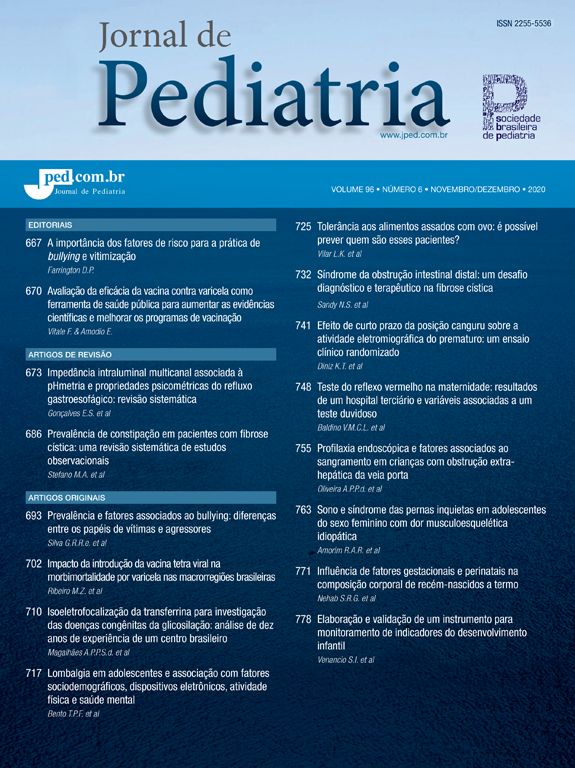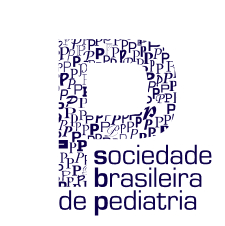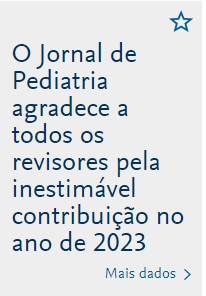To prospectively analyze the prognostic factors for neurological complications of childhood bacterial meningitis.
MethodsThis prospective study enrolled 77 children from 1 month until 16 years of age, treated for bacterial meningitis during the period of January 1, 2009 through December 31, 2010. 16 relevant predictors were chosen to analyze their association with the incidence of neurological complications. p-values < 0.05 were considered statistically significant.
ResultsOf the 77 children treated for bacterial meningitis, 33 patients developed neurological complications (43%), and two children died (2.6%). The etiology of bacterial meningitis cases was proven in 57/77 (74%) cases: 32 meningococci, eight pneumococci, six Gram-negative bacilli, five H. influenzae, five staphylococci, and one S. viridans isolates were found. Factors found to be associated with increased risk of development of neurological complications were age < 12 months, altered mental status, seizures prior to admission, initial therapy with two antibiotics, dexamethasone use, presence of focal neurological deficit on admission and increased proteins in cerebrospinal fluid (CSF) (p < 0.05). Initial pleocytosis > 5,000 cells/mm3, pleocytosis > 5,000 cells/mm3 after 48hours, CSF/blood glucose ratio < 0.20, female gender, previous treatment with antibiotics, community-acquired infection, duration of illness > 48hours, presence of comorbidity, and primary focus of infection were not associated with increased risk for the development of neurological complications.
ConclusionAge < 12 months and severity of clinical presentation at admission were identified as the strongest predictors of neurological complications and may be of value in selecting patients for more intensive care and treatment.
Análise prospectiva de fatores de prognóstico para complicações neurológicas da meningite bacteriana infantil.
MétodosEste estudo prospectivo recrutou 77 crianças de um mês a 16 anos de idade tratadas de meningite bacteriana durante o período de 1/1/2009 a 31/12/2010. Foram escolhidos 16 preditores relevantes para analisar sua associação com a incidência de complicações neurológicas. Valores P abaixo de 0,05 foram considerados estatisticamen- te significativos.
ResultadosDas 77 crianças tratadas para meningite bacteriana, desenvolveram-se complicações neurológicas em 33 pacientes (43%), e duas crianças morreram (2,6%). A etiologia dos casos de meningite bacteriana foi comprovada em 57/77 (74%) dos casos: foram encontrados 32 isolados de meningococos; 8 de pneumococos; 6 de bacilos gram- negativos; 5 de H. influenzae; 5 de estafilococos e 1 de S. viridans. Os fatores que se mostraram associados a aumento do risco de desenvolvimento de complicações neuro- lógicas foram idade < 12 meses, alteração do estado mental, crises convulsivas antes da admissão, terapia inicial com dois antibióticos, uso de dexametasona, presença de déficit neurológico focal na admissão e aumento das proteínas do líquido cerebrospinal (LCS) (p < 0,05). Pleiocitose inicial > 5.000 células/mm3, pleiocitose > 5.000 células/mm3 depois de 48 horas, baixa relação da glicose no LCS/sangue < 0,20, gênero feminino, tra- tamento prévio com antibióticos, infecção adquirida na comunidade, duração da doença
> 48 horas, presença de comorbidade e foco primário de infecção não se associaram a aumento do risco para o desenvolvimento de complicações neurológicas.
ConclusãoIdade inferior a 12 meses e gravidade da apresentação clínica na admissão foram identificadas como os preditores mais fortes de complicações neurológicas e podem ter valor para selecionar pacientes para tratamento mais intensivo.
Como citar este artigo: Namani S, Milenković Z, Koci B. A prospective study of risk factors for neurological complications in childhood bacterial meningitis. J Pediatr (Rio J). 2013;89:256-62.









